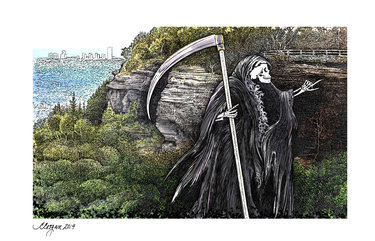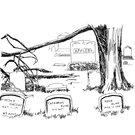An avoidable tragedy points the way to a safer path for Thacher Park
Nancy Ladd-Butz’s life changed forever on July 2, 2017. She was hiking with her daughter and her dogs on the Indian Ladder Trail at John Boyd Thacher State Park. Rocks falling from the limestone cliff that borders the trail hit her, crippling her for life.
Last week, the state settled with the Butz family for $9 million. The Butzes’ lawyer, George J. Szary, told our reporter H. Rose Schneider that the settlement was “obviously not a cause for celebration” when Ladd-Butz still underwent a tragedy and is living with the results of her injury.
We believe Nancy Ladd-Butz deserved every penny, and we urge those who have expressed other sentiments to look at “Exhibit A” — her doctor’s report on the consequences of her disablement; it’s public record under the New York State Court of Claims filings but excruciating to read.
One list details the salary Ladd-Butz has lost — she had worked teaching English as a new language in Albany city schools. There is a list, among many medical costs, of the pain medication she will have to take for life — it totals $17,708 for one year. There are calculations on the costs of modifying her living space to make it more accessible.
Among the over 270 pages, there is also a table of “Household Work That is Difficult/Impossible to Perform Since Her Disablement.” The lists are long under categories like kitchen, inside housework, outside housework, household management.
The report concludes, “Based upon my study of the nature and extent to which Ms. Ladd-Butz is no longer able to perform certain tasks within the home environment and in the care and maintenance of her residence and personal possessions, it was determined that Ms. Ladd-Butz will require the services of others to perform the household tasks that she previously was capable of performing, e.g., laundry, cooking, cleaning, certain residential maintenance activities, and the like.”
The descriptions of medical procedures and limitations are too personal and too painful to recount here. Suffice it to say: $9 million can’t restore the life Nancy Ladd-Butz led before the rockfall.
The pre-trial brief submitted by Ladd-Butz; her husband, Robert Butz; and her daughter, Kelsey Butz, shows what went wrong, the series of bad decisions that led to Ladd-Butz’s injury on July 2, 2017.
But in it we can also find the solution — what the state should do, going forward, to protect other park visitors from the fate that befell Nancy Ladd-Butz.
Depositions quoted in the court papers say that Maureen Curry, the manager of Thacher Park, became “very nervous” about rock falls and asked David Barone, assistant regional director, on April 12, 2017 to contact the Finger Lakes Region to see if their “scalers” would look at the Thacher Park ledges.
Scalers rappel along a cliff face to remove rocks and debris loosened by, among other things, the seasonal freeze-thaw cycle, thereby decreasing the risk of falling rocks hitting hikers.
According to the deposition of Regional Safety Manager Dean Bardwell, while the escarpment along the Indian Ladder Trail had been regularly scaled in the past, no rock-face scaling had been done for nearly 12 years prior to May 2017. Bardwell himself was among the last people to scale the escarpment along the Indian Ladder Trail a dozen years before.
A scaling team had existed for Thacher Park in the past and Bardwell had advocated on the need for such a team. And there is the solution.
Thacher Park needs a team of scalers to regularly check the cliff faces. The court papers say that the park had no policy for inspection of the rock face to assess safety or identify hazards.
Thacher Park needs such a policy and such a team.
The parks in the Finger Lakes Region have trails cut from the same Manlius rock formation as the Helderberg escarpment but that region has a permanent scaling team to identify changes in the stability of cliff faces along trails and to scale the cliffs to make the trails safer.
The Finger Lakes trails are not opened until the scaling is complete and then, throughout the year, park rangers inspect the trails, reporting possible hazards.
The scalers from the Finger Lakes Region in fact came to Thacher in May 2017 as a result of Curry’s request and removed potentially hazardous rocks along about a third of the trail, cautioning that the entire trail needed to be scaled, court papers say; nevertheless, the trail remained open.
We realize the Indian Ladder Trail is one of the major attractions at Thacher Park. The trail dates back several centuries to the time when Haudenosaunee used it to reach Henry Hudson’s trading post along the river that now bears his name. The limestone from the early Devonian age is rich with fossils that have attracted geologists from around the world.
We very much want the Indian Ladder Trail to remain open so that generations to come can marvel at its wonders. But it must be made safe, as safe as humanly possible.
A policy needs to be implemented and a scaling team put in place for regular inspections. The cost for taxpayers will be less than future multi-million-dollar settlements if the problem isn’t dealt with. And the cost for human loss and suffering is incalculable.


